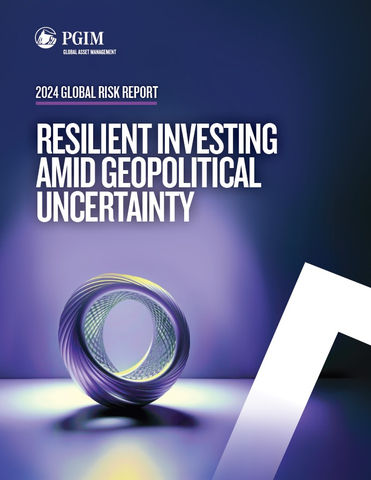PGIM survey: Investors to continue risk-on appetite in 2025, despite geopolitical uncertainty
PGIM's 2024 Global Risk Report reveals that 56% of top institutional investors consider geopolitical risk their primary concern. Despite this, one-third plan to shift to higher-risk investments in 2025. The survey, covering 400 institutional investors across 8 countries with $9 trillion in assets, shows investors are less worried about inflation and recession.
Key findings include:
- 48% identify the Taiwan Strait and South China Sea as the most likely risk to impact global markets
- 56% say 2024 election outcomes are influencing portfolio decisions
- 29% globally have increased cash holdings due to geopolitical uncertainty
- 48% believe there are too many geopolitical risks to effectively mitigate portfolio impact
The report suggests strategies like comprehensive diversification, quantitative models, and increasing real asset allocations to manage geopolitical risk and identify emerging opportunities.
Il Rapporto sul Rischio Globale 2024 di PGIM rivela che il 56% dei principali investitori istituzionali considera il rischio geopolitico la propria preoccupazione principale. Nonostante ciò, un terzo prevede di spostarsi verso investimenti a maggiore rischio nel 2025. L'indagine, che ha coinvolto 400 investitori istituzionali in 8 paesi con 9 trilioni di dollari in asset, mostra che gli investitori sono meno preoccupati per l'inflazione e la recessione.
I risultati principali includono:
- Il 48% identifica lo Stretto di Taiwan e il Mar Cinese Meridionale come i rischi più probabili che potrebbero influenzare i mercati globali
- Il 56% afferma che i risultati delle elezioni del 2024 influenzano le decisioni di portafoglio
- Il 29% a livello globale ha aumentato le proprie partecipazioni in contante a causa dell'incertezza geopolitica
- Il 48% ritiene che ci siano troppi rischi geopolitici per mitigare efficacemente l'impatto sul portafoglio
Il rapporto suggerisce strategie come una diversificazione completa, modelli quantitativi e un aumento delle allocazioni in beni reali per gestire il rischio geopolitico e identificare opportunità emergenti.
El Informe Global de Riesgo 2024 de PGIM revela que el 56% de los principales inversores institucionales considera que el riesgo geopolítico es su principal preocupación. A pesar de esto, un tercio planea trasladarse a inversiones de mayor riesgo en 2025. La encuesta, que cubre 400 inversores institucionales en 8 países con 9 billones de dólares en activos, muestra que los inversores están menos preocupados por la inflación y la recesión.
Los hallazgos clave incluyen:
- El 48% identifica el Estrecho de Taiwán y el Mar de China Meridional como el riesgo más probable que impacte los mercados globales
- El 56% dice que los resultados de las elecciones de 2024 están influyendo en las decisiones de cartera
- El 29% a nivel mundial ha aumentado sus tenencias en efectivo debido a la incertidumbre geopolítica
- El 48% cree que hay demasiados riesgos geopolíticos para mitigar efectivamente el impacto en la cartera
El informe sugiere estrategias como diversificación integral, modelos cuantitativos y aumento de las asignaciones de activos reales para gestionar el riesgo geopolítico e identificar oportunidades emergentes.
PGIM의 2024 글로벌 위험 보고서는 주요 기관 투자자의 56%가 지정학적 위험을 가장 큰 우려 사항으로 간주하고 있다고 밝혔습니다. 그럼에도 불구하고, 3분의 1은 2025년 높은 위험의 투자로 전환할 계획이라고 합니다. 9조 달러의 자산을 보유한 8개국 400명의 기관 투자자를 대상으로 한 설문조사에 따르면, 투자자들은 인플레이션과 경기 침체에 대해 덜 우려하고 있습니다.
주요 결과는 다음과 같습니다:
- 48%는 대만 해협과 남중국해가 글로벌 시장에 영향을 미칠 가능성이 가장 높은 리스크로 인식하고 있습니다.
- 56%는 2024년 선거 결과가 포트폴리오 결정에 영향을 미치고 있다고 말합니다.
- 전 세계적으로 29%는 지정학적 불확실성으로 인해 현금 보유를 늘렸습니다.
- 48%는 포트폴리오에 미치는 영향을 효과적으로 완화하기에는 지정학적 위험이 너무 많다고 믿고 있습니다.
보고서는 지정학적 위험을 관리하고 새로운 기회를 식별하기 위한 전략으로 종합적인 다각화, 정량 모델 및 실제 자산 할당을 늘리는 것을 제안합니다.
Le Rapport Mondial sur le Risque 2024 de PGIM révèle que 56 % des principaux investisseurs institutionnels considèrent le risque géopolitique comme leur principale préoccupation. Malgré cela, un tiers prévoit de se tourner vers des investissements plus risqués en 2025. L'enquête, qui a couvert 400 investisseurs institutionnels dans 8 pays avec 9 billions de dollars d'actifs, montre que les investisseurs sont moins inquiets concernant l'inflation et la récession.
Les principales conclusions incluent :
- 48 % identifient le Détroit de Taïwan et la Mer de Chine Méridionale comme les risques les plus susceptibles d'impacter les marchés mondiaux
- 56 % affirment que les résultats des élections de 2024 influencent les décisions de portefeuille
- 29 % à l'échelle mondiale ont augmenté leurs avoirs en liquidités en raison de l'incertitude géopolitique
- 48 % estiment qu'il existe trop de risques géopolitiques pour atténuer efficacement l'impact sur le portefeuille
Le rapport suggère des stratégies telles que la diversification complète, des modèles quantitatifs et l'augmentation des allocations d'actifs réels pour gérer le risque géopolitique et identifier les opportunités émergentes.
Der Global Risk Report 2024 von PGIM zeigt, dass 56% der führenden institutionellen Investoren geopolitische Risiken als ihre größte Sorge betrachten. Dennoch plant ein Drittel, 2025 in risikoreichere Anlagen umzuschichten. Die Umfrage, die 400 institutionelle Investoren aus 8 Ländern mit 9 Billionen Dollar an Vermögenswerten umfasst, zeigt, dass Investoren weniger besorgt über Inflation und Rezession sind.
Wesentliche Ergebnisse umfassen:
- 48% identifizieren die Taiwanstraße und das Südchinesische Meer als das wahrscheinlichste Risiko, das die globalen Märkte beeinflussen könnte
- 56% sagen, dass die Ergebnisse der Wahlen 2024 die Portfolioentscheidungen beeinflussen
- 29% haben weltweit ihre Bargeldbestände aufgrund der geopolitischen Unsicherheit erhöht
- 48% glauben, dass es zu viele geopolitische Risiken gibt, um die Auswirkungen auf das Portfolio effektiv zu mildern
Der Bericht schlägt Strategien wie umfassende Diversifikation, quantitative Modelle und eine Erhöhung der Allokationen in reale Vermögenswerte vor, um geopolitische Risiken zu managen und aufkommende Chancen zu identifizieren.
- None.
- None.

Read PGIM’s 2024 Global Risk Report: Resilient Investing Amid Geopolitical Uncertainty at pgim.com/geopolitical-risk (Graphic: Business Wire)
PGIM’s 2024 Global Risk Report: Resilient Investing Amid Geopolitical Uncertainty sets out to uncover how geopolitical risks are changing the way institutional investors are constructing their portfolios, surveying 400 institutional investors across eight countries, representing
OPPORTUNITY IN A TENSE GEOPOLITICAL ENVIRONMENT
Among possible geopolitical flashpoints, investors say they are monitoring the Taiwan Strait and South China Sea, with nearly half (
However, despite a heightened sense of geopolitical risk, investors say they are ready to take on risk in their portfolios — a sign that institutions are taking a long-term view and looking at volatility as an opportunity. One-third of institutional investors in the survey said they plan to have an aggressive portfolio strategy (i.e., taking on more risk) by the end of 2025, compared with about one-quarter who are currently aggressive in their risk tolerance.
INVESTORS CAUTIOUS AROUND ELECTIONS, BUT DON’T EXPECT SURPRISES
More than half of investors globally (
While
About three-quarters of institutional investors also said their portfolios are moderately or well prepared for any repercussions stemming from major elections in 2024, reflecting confidence that policy outcomes in the
INVESTMENT STRATEGIES FOR AN UNPREDICTABLE WORLD
Nearly half of the survey’s respondents (
The report details several approaches investors are using to manage geopolitical risk and identify investment opportunities — such as data centers and alternative energy — that are emerging as a result of geopolitical shifts.
A comprehensive approach to diversification and liquidity can mitigate risk by helping investors avoid becoming a forced seller during unexpected events. Quantitative models can make it possible to keep investors ahead of the curve as trends begin to change. Some solutions, such as buffered ETFs, can help mitigate downside risk while maintaining some exposure to the upside. Other recommendations include increasing allocations to real assets, stress-testing portfolios with scenario analysis, and utilizing active strategies.
For more, read PGIM’s 2024 Global Risk Report: Resilient Investing Amid Geopolitical Uncertainty at pgim.com/geopolitical-risk.
ABOUT PGIM
PGIM is the global asset management business of Prudential Financial, Inc. (NYSE: PRU). In 41 offices across 18 countries, our more than 1,400 investment professionals serve both retail and institutional clients around the world.
As a leading global asset manager with
Prudential Financial, Inc. (PFI) of
* As of June 30, 2024
CONNECT WITH US:
Visit pgim.com
Follow on LinkedIn
View source version on businesswire.com: https://www.businesswire.com/news/home/20240910050196/en/
MEDIA
Alyssa McMahon
+1 973-204-5808
alyssa.mcmahon@pgim.com
Source: Prudential Financial, Inc.







